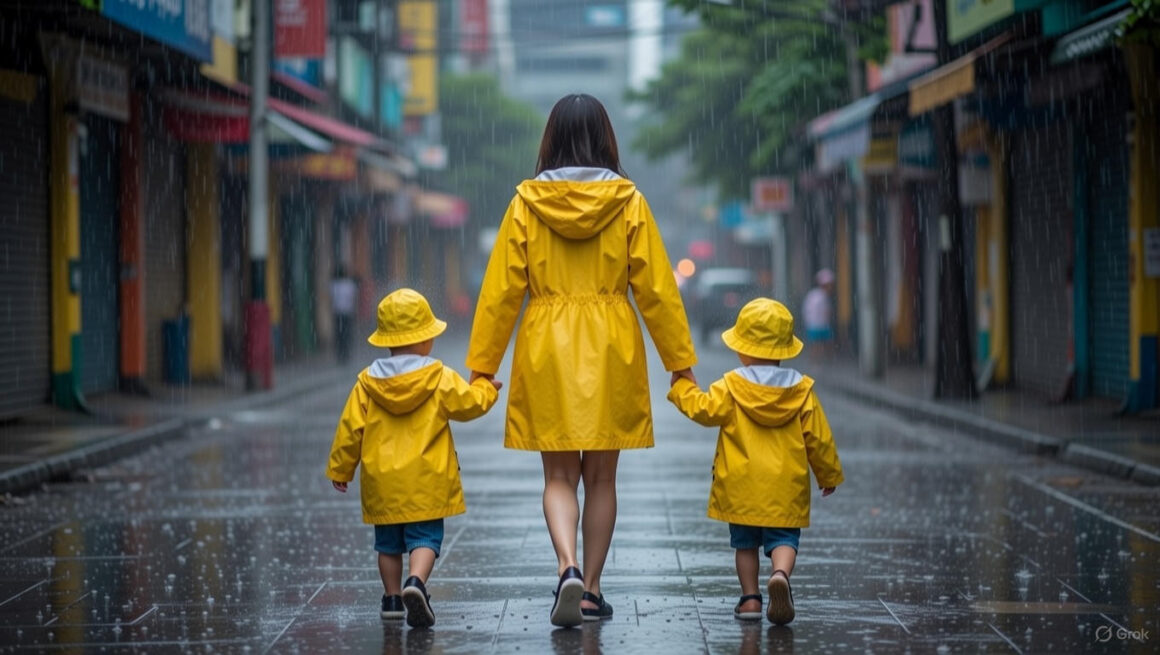People who want to turn the next chapter of their lives into a location independent one are going to have a number of obstacles and realistic reasons why they feel they shouldn’t become a digital nomad.
I’ve been on the road since 2010 and I wrote this article a few years later, on the original Hobo with a Laptop. You can find an archive of that here if you’d like to read the original comments.
This is one of the first articles I ever wrote –it certainly is not my best work. But it seemed to have resonated with a lot of people at the time.
And here it is..

At the time of writing, I’m a 35-year old from Canada. I left home at 18 to move out West, and that kicked off a series of further moves over the next 12 years.
By age 30, I made it to Canada’s East Coast before I decided to make a permanent conscious move towards digital nomadism, when I set my sights on living in Asia.
When I left home the first time, I was in the same boat as many Millennials today, and when I left the second time, I shared a lot in common with my current 30-something peers.
Leaving at 18 meant college in a city where English was a second language (Montreal), lots of odd jobs, and eventually settling into self-employment working from home making websites, pre-Wordpress.
Before I left for Asia things had become ‘more adult’. I had a career but returned to self-employment a second time, a steady relationship with someone I thought I was going to marry, and I had accumulated possessions just like anyone else.
Both of these transitions proved to me that it’s possible to reinvent yourself on more than one occasion. Both times I had to re-educate myself with modern “roadworthy skillsets”. If I could do it with very little resources, anyone can. I am not naïve when I suggest that even the most complicated people can become location independent.

30 Reasons Why Not to Become a Digital Nomad –and How to Overcome Them
This article isn’t going to make a hard sell on the lifestyle; truth be told, it’s a lot of work. And I wouldn’t have it any other way. Being a digital nomad is all about how you spend your off-time.
If this article resonates with you, I’d love to hear from you in the comments.
Part 1: Money
Unless you majored in finance, or you’re a tax professional, you’re not going to know what you don’t know. Finances are the most complicated obstacle to overcome for anyone trying to rationalize their wanderlust, so I thought I’d start here.
Worth mention; you cannot declare bankruptcy on your student loans, so I’m not even going to go there.
If you’re going to make it work as a digital nomad, you will need to:
- Open a savings account and make a deposit schedule (treat it like a weekly/monthly bill)
- Start looking for creative ways to augment your income
- Manage your debt and plan for recovery
- Eliminate some frivolous spending
- Systematically eliminate monthly bills, banking fees, and get rid of needless possessions

1. Bills, Debt, Mortgage, and/or Student Loans
For the sake of all concerned, you are not abandoning your responsibilities if you approach your debts with an open-minded sense of accountability.
Living in a state of “slow travel”, in countries that have a lower-value currency than the one you earn day-to-day will help you reduce living expenses. But how does one begin to unravel the strings of finance that bind us to a failed system bent on creating debt?
You talk about it with a professional.
A simple conversation will likely result in consolidated debt payments and manageable lower monthly payments –living abroad and consolidating your debt could actually be the solution, or the perfect excuse, you’ve been looking for. You won’t know unless you ask. National Debt Relief is one such company, with impeccable reviews on third-party rating sites.
2. No Money Saved
Saving money in the current economy is difficult, but not impossible. The trick is to not fall victim to thinking that small victories carry little or no weight to them.
Any expense you resist is money in the bank. If you were going to purchase something, and then didn’t –the cost of that forgone expense doesn’t need to go back into your spending money.
The amount you put away doesn’t need to be large, it just needs to be regular. Several micropayments to yourself throughout the day, for say, skipping a cup of coffee, waiting to download an app until you’re on a free WiFi connection, or leaving an item or two behind at the grocery store checkout all add up to substantial weekly payments you can put in your savings account.
A bottle of ketchup you opted not to purchase is 3% of a hundred dollars. You only need 8 one hundred dollar bills to buy a one-way flight to Thailand.
Multiple micropayments made to yourself throughout each day become just as addictive as someone hitting Like on a Facebook status. These small victories become a game, and a badge of honor.
To adjust your mindset and prepare yourself for success, understand that you are not removing things from your life; you’re simply not adding things.

3. Self-Indulgences
All of those impulsive, emotional purchases that we make throughout the week because we had a bad day, a nasty breakup, a terrible day at the office, or because we simply think “we earned it” are the temporary distractions that keep you tied down. This is the stuff of TV commercials to keep you making frivolous purchases.
A few nights out with friends can be converted into online training. A week’s worth of Red Eyes or Macchiatos can be traded for a WordPress theme, and an occasional glass of wine can be had at a friend’s home for a lower cost –not your local watering hole. Just indulge differently.
4. Priorities
Classify your need to travel as an emergency. If your situation is already dire and alcohol, coffee, or eating out are already luxuries you cannot afford (and therefore don’t have them to trade up for a fuller savings account), you might want to consider reading this post about making emergency money. Where there’s a will –an iron will, there is always a way.

5. Hidden Money
If you’ve been using a credit card to make purchases, you might already have “money in the bank” in the form of air miles or rewards points.
Depending on how far in advance you start planning, you may be able to switchover to a credit card that accrues rewards, or bank on points you’ve already accumulated.
In either case, if credit card rewards are on the table, I suggest you take a look at the following articles:
- How to Pick the Best Travel Credit Card – Nomadic Matt
- Digital Nomad banking in 2026 — Hobo with a Laptop
- How to buy $54,000 of round-the-world flights almost for free – Business Insider
- How to Get Free Flights with Credit Card Rewards – Under 30 Experiences
6. The Value of “Stuff”
Most electronics depreciate in value like clockwork; their obsolescence is engineered. If you’ve thought about selling off that video game console, surround sound system, desktop computer, or massive widescreen television –this is the time to do it. Either sell it, or trade it into things you’ll need for your journey.
7. Monthly Bills
Dropping things that come with monthly bills like TV cable bills, larger-than-needed data packages or gym memberships will save a thousand dollars or more over the course of a year. Consider lowering your usage of monthly services and pick up your own free weights for the cost of one month’s gym membership –you can sell them before you leave, too.

Part 2: Work
After sorting yourself out financially and taking debt head-on, your next obstacle will be continuing to make an income while you live abroad.
8. Finding Nomad Jobs
If your job can be facilitated online, great. Although I still suggest looking for remote work options.
Working nomads have grown in such numbers over the last decade that today there are plenty of options in terms of remote job opportunities.
In fact, there are so many “nomad jobs” available to you, we wrote an entire post about it. Give it a look, there is bound to be something on our nomad job site list that will work for you.
If you lose your job on the road, it won’t be a catastrophe you can’t walk away from.
9. Lack Required Skills
If you lack the skills you need to become a digital nomad, you can take courses online during the evening or on weekends.
Some reputable courses I recommend:
- Learn how to code with these 9 free online courses
- Learn how to make your first dollar online
- Learn how to create your own online courses
- Learn how to leverage Pinterest for SEO

10. Gap in Your Resume
Nonsense. I still get “real” job offers on Linked In in spite of my years doing freelance work and consulting. A gap year or three can be explained away in a single entry on your resume or Linked In profile.
And don’t discount the fact that a number of large corporations hire freelancers; I’ve done work for Trivago, Adidas, and Mouser Electronics through freelance job sites, to name a few. If I was looking for work, these brands would be an attractive addition to my resume.
On top of it all is what you’ll be able to accomplish as an entrepreneur with your side hustle –something virtually impossible to do back home, with its higher cost of living.
11. Working Remotely is Challenging
Yes, you will need to manage your own time, and yes, you will need to cobble together online tools to make yourself a reliable, functional working nomad.
You’ll need industry-grade tools to facilitate your online work:
- Grasshopper destroys Skype in terms of VOIP phone functionality for business
- Asana, Trello, Slack, Basecamp, or TimeDoctor can help you orchestrate projects with remote teams
- Wise will help you open bank accounts in foreign countries from your laptop for easy invoicing
- PO Box Zone will help you handle your mail like a local, back home
You might also like our complete list of digital nomad productivity tools, and our post about adapting to the unpredictability of living abroad.

Part 3: Logistics
In addition to remote work-related obstacles, there are other logistical challenges to overcome.
12. Complicated Visa Requirements
Every country has its own visa requirements which vary depending on where you’re from. If you’re headed to Thailand, I wrote a 200+ page guide on how to become a digital nomad in Chiang Mai, Thailand. You can find the free ebook here.
If Thailand isn’t for you and you’re scared of making mistakes –first search Google with search terms like “country name” + “visa requirements” + “digital nomad”, and then once you get some perspective, consider calling a travel agent or the local embassy for the country of choice within your own country. Digital nomads will often share free information on how to stretch visas as far as they can legally go.

13. Traveling with Kids
If you have a family; bring them.
Swiss Family Robinson fans will be pleased to know that there are plenty of digital nomad families on the road, and I’ve personally met a number of them.
2026 edit: I am one of them — my sons are currently 3 and 5 years old.
This too is a topic which requires much explanation and I invite you to read our post on it here. Within that post, we’ll also introduce you to a number of successful digital nomad families, show you where to find a school for your kids, and you can also find family-friendly accommodation in Chiang Mai, Thailand here and here.
14. Still in School
Back in the days of The Great Gatsby, “an education” meant visiting a distant relative half way around the world for a summer. And IMHO, they had it right back then. Besides my personal belief that all this overpriced education is bankrupting Millennials –and for what? Fiercer competition for scarce jobs followed by decades worth of debt? A more “compliant” generation of text-book-smart voters? Free education would do the same thing IMO.
My response to this one is four-fold:
- Your heroes are dropouts
- You could study abroad
- Who’s to say what you can accomplish when you’re surrounded by like-minded people
- I’ve already explained away gaps in your resume
IMO the stigma of living beyond the almighty “gap year” is a fear tactic of the unadventurous, and a lot can be accomplished when you’re open to new ideas and in the right environment. It’s your choice to make, it’s your journey for relevance, meaning, happiness, substance, and a life worth living. What is that for you?

15. Your Stuff is in Storage
If there are items you can’t part with like family heirloom furniture or vehicles, you’re going to have to find a home for them.
You can obviously rent storage or entrust a friend or family member –and if you opt for either, remember that climate control is incredibly important for furniture. If you’re going to store furniture anywhere, ensure that it’s not laying directly on the ground, it’s in a climate controlled area, and not wrapped in plastic as that will lock in moisture and make it get moldy faster than you’d imagine.
However, I’ve met dozens of nomads who tried to keep their possessions in storage as a safety net, only to part with them later. It’s hard to get top dollar for your abandoned possessions if someone else is doing the selling for you, so make backup arrangements with someone you trust should you decide to sell your stuff from abroad. Or simply be prepared to abandon them altogether; don’t store items of sentimental importance in the same place as items you may abandon later –that just complicates things.
16. What to Bring with You
This one is easier than you think, you don’t need to become overly obsessed with your packing list and you won’t have to pack for eventualities or “just in case” situations.
The world is full of people who require the same products you do, and the cost of picking them up on your journey is likely a lot cheaper than what the added weight of your luggage will cost you at the airport.
Despite my own previous fascination with scouring the web for digital nomad packing lists –the truth is that most “must-have” travel accessories aren’t.
You can see what I put in my luggage here. If you’re headed to Thailand, you can also learn what I’ve suggested you don’t pack in your luggage here.

Part 4: Personal Considerations
Now that we’ve covered dollars and sense, logistics, and work –let’s take a look at the human considerations you may be dealing with.
17. Criticism
Your decision to live abroad and work from your laptop is in direct opposition to the choices and values most people hold –therefore not making it good dinner conversation.
Few to none will be genuinely supportive of your lifestyle choice, and they’ll try to debate the notion right out of existence. And that’s why I wrote “How Digital Nomads Handle Criticism for Rejecting the Status Quo” which you can read here.
18. Fear of Flying
You never fully get over your fear of flying. After almost 20 years of regular flights around Canada, the US, and Asia –life still finds ways to scare the living bejeezles out of me on 1 out of 10 flights. But it does get better, and the fear dissipates with experience.
First, let’s look at the facts; only one in 3,000,000 flights is fatal. Traveling by car or truck is 100 times more deadly than flying, and traveling by rail is twice as deadly as flying.
While we’re wired to fear the unknown, this whole entire lifestyle choice is all about getting over your fears. Or at least, it could be. That’s your choice to make.

19. Spouse or Partner Won’t Go With
Life has a way of moving around the furniture for you, right when you need it to. It’s important to be honest and pragmatic with yourself when deciding what to do about your significant other. If you’re married, this might be the end of the line for your dream of becoming location independent.
This is how it worked out for me; after planning to go to Thailand with only 6 months remaining until we made the jump, my then-girlfriend (who I thought I’d later marry) took a new career job and bought a car. When the time came I got onto that plane alone.
I took the Bill Murray approach to marriage –and I am happy I did. Today I’m married to the most amazing woman in the world, and we’d have never met if I made compromises for a woman that didn’t fully believe in me.
2026 edit: We separated after 8 years together, and having two sons.
“If you have someone that you think is The One, don’t just think in your ordinary mind, ‘Okay, let’s make a date, let’s plan this and make a party and get married.’
Take that person and travel around the world. Buy a plane ticket for the two of you to travel all around the world, and go to places that are hard to go to and hard to get out of.
And if when you land at JFK and you’re still in love with that person, get married at the airport.”
– Bill Murray
Life revealed the solution to this obstacle when my former girlfriend bought a car and took a serious job. By the time “T-Day” rolled around we didn’t fight –we simply had an honest discussion.
She knew I would be miserable if I didn’t make good on this promise I made myself, and she said she couldn’t live with the fear of uncertainty if she did.
So my only advice here is to evaluate your compatibility, mutual desires, individual strengths and weaknesses, and be pragmatic. Unexpected lifestyle changes like becoming a digital nomad can be relationship suicide.

20. Going Solo
For many, the idea of going solo is absolutely insane at first. And it really slaps you in the face your first couple nights sleeping alone at a guest house in a foreign country.
However, solo travel is one of the most liberating things you can do in your life. Everyone back home talks a big game about how independent they are, what they would do if –but few truly know jack when they’re still suckling the teet of lifelong relationships, only take Truman Show-like vacations, and have their whole life mapped out for them by society or otherwise.
If you go solo, you’ll learn a few things about yourself you couldn’t learn under the mass projections of everyone who knows you back home. It’s sort of like a distillation process. “Why Not?” becomes your mantra, and you relearn what you like, and what you don’t.
For this to work, you need to be alone and free of the projection of others. Your reactions to certain experiences have been mapped out since you were a kid. Travel simply makes time to renovate your psychology.
21. Loneliness and Homesickness
To fend off loneliness, I recommend the occasional guided tour, staying at a hostel dormitory, joining the 40,000+ member Digital Nomads Around the World Facebook group, and possibly even looking into digital nomad dating websites like Nomad Soulmates or Date a Nomad.
You’re carrying a supercomputer in your pocket and free Wi-Fi is bountiful; schedule regular Skype calls with loved ones. You are not abandoning anyone or anything, you’re simply changing how you communicate.

22. Safety
Solo female travel is safe when you have your wits about you. Blending in by respecting the dress code, customs, and culture of countries you visit will offer additional protection (and some really fabulous fashions, girl).
Ask around any forum on the subject if you need a second opinion. I recommend you check out Digital Nomad Girls –it’s a strong community my wife has had the privilege to join, and it comes highly recommended.
If you’re a man, I humbly suggest you don’t “white knight” on your travels, or get tangled up with risky women. You have very few rights when you’re abroad, and it’s usually wise to avoid domestic situations which may unfold around you. Violent situations tend to favor the locals involved, that whole he/she/they said thing, and they could be drunk and/or carrying a concealed weapon. Bad combo.
Both men and women should keep in mind that locals wherever you roam will have a “home team advantage”, and just like back home, locals will occasionally mess with foreigners.
If you observe travel advisories from your own country and ask questions in online forums, you’ll likely never run into any serious trouble.

23. Crime, Hate and Terrorism
I’m writing this post in April 2017, days after a terrorist attack in the Bohol area of the Philippines –not too far from where I currently live. Did you expect me to paint a happier picture?
No need to; the United States has had planes fly into buildings, trucks are crashing into crowds all over Europe, daily shootings all over the Western world (this one from 15 hours ago in Atlanta), mass protests with police brutality in the double digits this year alone, and hell –you can’t even use the wrong bloody pronoun in Western culture without people screaming “safety” in your face. The world isn’t always going to be a nice place.
It doesn’t matter where you’re from, anyone some place will think it’s scary some other place. The world is what it is, everywhere. I’d never let that stop me, although I won’t try to sway you in any direction.
24. Health and Immunity
Longer trips outside of your country mean that your body will be introduced to a number of new friends who are of the bacterial and viral persuasion. And antibiotics or the other harsh drugs can make matters worse, which is why I recommend having a health-conscious daily regimen.
Probiotics, non-pasteurized apple cider vinegar, coconut oil, fresh garlic, plenty of greens, and zinc-rich foods like shellfish will help bolster your immunity and keep you in top shape while lowering your chances of traveler’s diarrhea –the gift that keeps on giving.
If you plan to be anywhere for a few months, consider working out at home. 5-liter water jugs make great free weights.
And as a precaution, bring extra allergy medications, prescriptions, insulin, and a few EPI-pens if these are necessary. Record the addresses of hospitals in the area you’ll be visiting in advance and keep them in your wallet with you at all times.

25. Food Poisoning
Food poisoning sucks, and it’s even worse when you’re far away from your home country. Although I’ve had my fair share of health problems over the last 5 years, I’ve never thrown up from eating spoiled food.
The trick with street food is to avoid places that have little traffic, too much food, too large of a selection, and no heating devices. Food that’s cooked right in front of you is your safest bet, or in the least that’s been cooked within the last five to ten minutes. Scope out street food joints for a few minutes, evaluate their cleanliness, what’s turning over the fastest and order that.
I’ve never been to a restaurant in Asia that used tap water for ice cubes, but it’s good to keep an eye out for it –however, I do brush my teeth with tap water to build my immune system.
Fellow bloggers and occasional neighbors in Chiang Mai, Adam and Hannah from Getting Stamped have a very in-depth post about street food safety that you might want to read if this is a big concern for you.
26. Other Cultures Are Awkward
Most of us are at some level of beginner. If we were all honest with ourselves, we’d see we’re always beginners –no one is born understanding the nuances of every culture they pass through, and it can lead to situations that are as humbling as they are hilarious.
If you think other cultures are awkward, then I very respectfully think that’s something you need to get over to be a highly-functioning, classy human being. When you do explore other cultures, look for patterns in crowds, observe body language, and keep an eye out for signs that outline rules, dress codes, and so on around tourist attractions, government offices, and Holy places. Body language is universal.
27. Unknown Languages
Most countries you will visit probably speak English, however, if you find yourself in a place like rural China –English may only be a language understood by the youth in the area.
If you’re ever lost or confused and there’s no sign of English anywhere, find a young adult and ask for help. Young adults in foreign countries love helping foreigners like yourself –at least that’s my experience.
Otherwise, there’s Duolingo and Google Translate for your smart phone. If you plan to head to Thailand you could probably get by with only English –however, if you want to learn the local language quickly I recommend checking out my friend Brett’s “Learn Thai from a White Guy” or a regular-paced language school you can find in this post.

28. Carbon Footprint
Although I believe ‘carbon footprint’ is a means to ‘carbon credit’ purely for creating a new economy based on a guilt tax that’s only about to do with money and not the environment –there will be those that do not understand carbon dioxide is actually plant food and the world is greener today than it ever was.
Chicken Little, anyone? Hot damn the climate change astroturf sure trumped up teen suicide numbers, you think?
However –as I originally wrote this article a decade ago: With rising sea waters and large-scale annual forest fires being of greater concern as we near the apocalypse combat climate change –the carbon footprint created by coal factories in the developing world and massive jetliners that travelers rely on to get around is top of mind for many people considering the leap into location independence.
It’s easy to assume that we fly around too much and have larger carbon footprints. I found this comparison between Netherlanders and the average digital nomad interesting. It makes the case that our carbon footprint isn’t as big as one might assume.
For most of us, being a digital nomad is about living with less. Minimalism and nomadism go hand in hand. In the developing world we take up less climate-controlled space, don’t live in homes that need heating all winter, many forgo air conditioning much of the year after they’ve acclimatised to the heat and make do with low-energy fans. You’ll often see us with pretty great solar-powered laptop chargers (just remember you likely can’t carry un-labeled power banks or those over 10,000 mAh in a carry-on –especially in China), and we get our laundry washed by hand.
There is no fully-scientific argument either way in terms of your average digital nomad’s carbon footprint, although it is definitely something to be mindful of as we consume natural resources and plan our slow travel from place to place.

29. Too Old
If you can handle brisk walks, warm weather, and don’t use a walker or a wheelchair you’re probably not too old. This isn’t just a Millennials’ game.
I came at 32 and some of the most interesting nomads I know are in their 60’s, and they’re doing just fine publishing content online.
The warmer weather is also ideal for snowbirds trying to avoid constrictive, cold and icy climate during the winter.
If your health is a concern, consider researching medical tourism. Many countries have affordable healthcare that specializes in care for the elderly –from diabetes to heart conditions, retiring abroad has never been easier.
30. Terrible Pension
Few of my elder peers have good pensions to boast of, and the higher value currency they do have back home is why they’re living abroad. Money goes further when you have the whole world to choose from. And conveniently enough, that includes tropical paradise.
In the very least, let me make one suggestion; if the idea of living in Asia or someplace in the developing world scares you –please consider living on a cruise ship.
The concept of seniors living on a cruise ship isn’t new, and it comes with its own challenges like insurance, proper care for specific requirements, and meals aren’t always included.
A reservation on many cruise lines runs about $135 per day which is often cheaper than assisted living, and there’s no waiting list. Some cruise lines are all-inclusive, they’re hip to seniors as assisted living costs continue to rise, and you get treated like a customer (not an invalid).
Special considerations:
- Can you be insured while living on a cruise ship?
- Are there certified health care practitioners on board?
- What are your health needs like; can you handle being away for months at a time?
- Do they offer a senior’s discount?
- Meals included –breakfast in bed every day?
- Are other basics included such as free soap, shampoo, toothpaste, razors, etc.?
- Is room cleaning, maintenance included?
- Are online reviews mostly positive?
- If you are injured on board, how will they compensate or treat you? With what equipment?
- Are there already other seniors living aboard?
Additional research about pensioners and seniors living on cruise ships long term or full time can be found below:
- Retirement Living on Cruise Ships – Snopes
- Meet the 86-year-old widow who’s spent 10 years living on a cruise ship – Telegraph
- More Folks Retiring on a Cruise Ship – CNBC
- Cruise Ship Retirement – A Place for Mom
In Summary
Many of these reasonable challenges to becoming a digital nomad were once my own, and some of them will be mine to chew on in the coming years. With some thoughtful introspection I think they can all be overcome.
It’s not easy leaving behind what feels familiar, but the things you fear in the beginning are just your initiation –they’ll likely become the things you love about being a digital nomad later on.
The global digital nomad community is pretty amazing. We’ve all learned a lot from each other’s mistakes, and I think it’s safe to say that the movement has matured into the mainstream.
If you make the question of safety an obstacle, or the fear of risk a barrier to entry; you’ll simply never, ever win. If you hate moving, I say pack lighter. You don’t need as much as you think you do. If you’re worried about losing friends, you won’t. You’ll just interact differently.
Jump.
We live in prolific times and making the leap into nomadism has never been easier. I provide no warranty when I say this; but you cannot fail if you do not stop trying. You probably wouldn’t be reading this blog post if you didn’t feel like something was missing. Traveling well long-term is a learned skill and there’s no time like the present to start learning.
At the end of the day, the only obstacle that really stands in your way is you.
Did you enjoy this post? We’re currently looking for guest post opportunities on fellow travel blogs and we’d love to write for your audience. Interested? Please contact us.
Did you like this post? Please consider dropping a comment for the next casual reader. If you’d like to read comments from the original iteration of this post, you can find those on an archive here.
Your IP is Showing!
It's 212.30.36.47
Consider using a VPN to mask identifiable information that can be used by hackers and governments around the world to decipher your physical location and observe your private browsing habits. Make it look like you're in a different location and get region-specific content. Watch American Netflix all over the world, even if you're in the Philippines.


